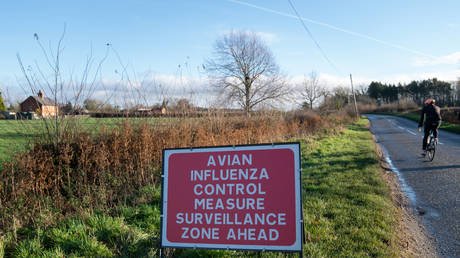
A case of the H5 strain has been identified in a person from South West England
Officials have confirmed that a person has contracted bird flu, believed to be the potentially fatal H5N1 variant. It is the first human case of the strain, which has a mortality rate of around 60%, in the UK.
On Thursday, Professor Isabel Oliver, chief scientific officer at the UK Health Security Agency, told the BBC a case of bird flu had been detected in a human in South West England.
“While the risk of avian flu to the general public is very low, we know that some strains do have the potential to spread to humans and that’s why we have robust systems in place to detect these early and take action,” Oliver stated.
The health security boss said that officials had followed up with the individual’s contacts and had not found any evidence that the virus had spread to other people.
“Currently there is no evidence that this strain detected in the UK can spread from person to person, but we know that viruses evolve all the time and we continue to monitor the situation closely,” she noted.
Officials from the UK Health Security Agency (UKHSA) said that the person who contracted the virus had been in “very close, regular contact with a large number of infected birds, which they kept in and around their home over a prolonged period of time.”
READ MORE: Kazakh authorities reveal police death toll, stay mum on civilian casualties
It is not clear whether the individual has been infected with the specific H5N1 variant which has caused numerous outbreaks within bird populations in recent months. According to the BBC, one million birds were culled over the last month in Lincolnshire alone to slow the outbreak.
H5N1 causes a highly infectious, severe respiratory disease in birds. It rarely infects humans, but when it does, it has a mortality rate of about 60%.
The World Health Organization has been informed about the British case.




